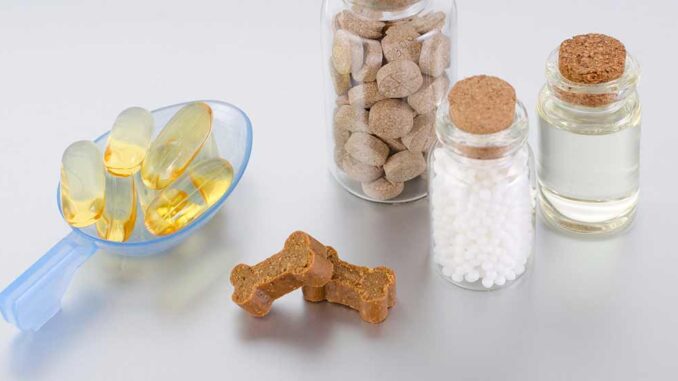
This article was updated on August 9th, 2022
In this article, we review the best cough medicine and home remedies to help your dog with excessive coughing. Of course, you should always consult with your veterinarian before giving your dog any new medicine or trying any home treatment: coughing is a symptom of several serious medical conditions, and you do not want to delay important treatment that your dog may need from the veterinarian. This is particularly true if your dog presents other symptoms such as loss of appetite, fever or any other signs of illness. Always consult with your veterinarian before giving new medicine to your dog.
If your dog is coughing but appears to feel well overall, you can consider the following cough medicine. It’s important to know that these cough medicine options and home remedies do not address the root cause of your dog’s coughing – but they can help avoid irritation of the respiratory tract and they can make your dog more comfortable while you work on solutions with your veterinarian.
The Best Cough Medicine & Home Remedies for Your Dog
1. A Teaspoon of Honey
Natural remedies can provide temporary relief for your dog while you try to figure out the underlying cause with the help of your veterinarian. A teaspoon of honey in a cup of warm water may ease a sore throat. This is not recommended for puppies or for dogs with diabetes as it can interfere with glucose regulation.
See these example comments from people who were able to help their coughing dogs:

2. Chicken Soup
While there are many jokes about “Grandma’s chicken soup,” chicken soup can help hydrate your dog. Don’t use commercial soups. They are processed and often have high levels of sodium which are especially bad if your dog has a heart condition.
Instead, make your own by putting a whole chicken or pieces of chicken in your slow cooker. No spices. Let that cook all day in some water. Shred the meat. A bowl of that, served warm to increase enticing odors, offered separately or poured over some food, is a big hit with the canine crew.
3. Cough Syrup for Dogs
PawHealer has a range of natural herbal cough medicines formulated for dogs, and for different types of coughs.
There are many natural cough remedies on the market, and while they may soothe a tickle in the throat, it’s important to determine the underlying cause of the cough with the help of your veterinarian. Your vet will be able to advise you on the best course of treatment for your pet, and whether any natural remedies will also be beneficial.
PawHealer syrup for Kennel Cough:
For collapsed trachea & more:
For gag/hack/wheeze:
Salutem Pets dog coughing supplements:
4. Over The Counter Medicine: Dextromethorphan (ex, Robitussin, etc.)
Dextromethorphan is a common ingredient in human OTC cough medications such as Robitussin, Delsym or Balminil. It can be helpful for some dogs short term. This is an “off label” medication so you should check with your veterinarian about use in your individual dog (you should always check with your veterinarian before giving your dog any human or pet medication: for example, human cough medicines can be toxic to dogs).
It is not recommended for dogs with liver problems or for dogs on a number of medications, including tramadol, amitraz containing collars, or selegiline.
Are There any Potential Side Effects or Risks with Dextromethorphan? You should never give your dog any medication, including dextromethorphan, without the consent of your veterinarian. Dextromethorphan may cause side effects such as vomiting, diarrhea, and neurologic issues. This medication may also interfere with other medications that your dog takes. Cough is not a labeled indication for dextromethorphan in dogs.
5. A Humidifier
Excessively dry air can cause coughing in dogs. If you have a humidifier, encourage your dog to rest in that area. Be sure your humidifier is clean and not moldy.
 | “A winter cough may be caused by something as simple as dry air. Try using a humidifier to see if it helps.“ Dr. Debra Eldredge, Veterinarian Author of the “Dog Owner’s Home Veterinary Handbook” |
No humidifier? When you go to shower, have your dog come into the bathroom. The warm, moist air can help just like a humidifier.
If you have a small portable humidifier, you can set it up next to your dog’s crate. Then cover the crate with a sheet to keep moisture in. Plain water is best.
Learn more tips by reading our article on “Best Home Remedies to Help a Coughing Dog“.
6. Prescription Cough Medicine
The most important thing to do when your dog is coughing is to determine the underlying cause. Dogs may cough for a variety of reasons, including viral, bacterial, and fungal infections, parasites, asthma, cancer, and heart failure. Treating your dog at home for the cough without getting a diagnosis will delay proper treatment and may make the underlying condition worse.
Suppressing a dog’s cough with medications can force infectious agents to stay in the lungs instead of being coughed up. Your dog could become much sicker.
Treatment by your vet will vary with findings and may also include the following:
- Antibiotics may be needed to combat infection. There are many antibiotics used to treat respiratory infections in dogs. The proper antibiotic will be chosen by your veterinarian depending on the dog’s diagnosis. Antibiotics are generally safe for most dogs, but should never be given without a veterinarian’s prescription as some have side effects that can be serious. Antibiotic resistance is also an issue that can affect the dog being treated as well as other animals and humans living in the household. Amoxicillin is a commonly prescribed antibiotic.
- A cough suppressant may be needed to give your dog and his respiratory tract a break from the coughing. Easing the cough may help your dog eat, drink, and rest easier, which promotes healing. The cause of the cough determines what sort of medication your vet will suggest. Common examples include maropitant (Cerenia®) and Hycodan®. These medications may cause your pet to be more tired than usual.
Interventions for more extreme cases:
- Your dog may need to be hospitalized and placed in an oxygen cage.
- Though it’s not very common, bronchodilators may be prescribed to open up his airways for better air flow.
When Cough Medicine is NOT Enough

The causes of a cough in a dog are varied and dogs cannot talk to us and tell us how they are feeling. Delaying a veterinary visit could endanger your dog if he has a serious underlying cause for the cough.
At a minimum, you need a phone call into your veterinarian if your dog is coughing. These symptoms should incite a visit to the office:
- Open mouth breathing along with a cough
- Pale or bluish mucous membranes (look at his gum color)
- History of a heart condition, including a previous heartworm infection
- History of cancer
- Difficulty breathing – including labored breathing and very rapid respiratory rate
- Fever
- Pus type discharge from his nose
- “Feeling sick” – lethargic, not wanting to eat or play
- Collapse
What to Expect from Your Vet
If your dog has a serious cough, your veterinarian will do a number of procedures. The first step is a complete physical examination. Depending on the clinical signs, this may include:
- A thorough auscultation – listening to all areas of his chest with a stethoscope.
- Radiographs (x-rays) so the lungs can be carefully evaluated.
- Bloodwork to rule-out situations like heartworm, anemia, and bacterial or viral infections.
- A culture and sensitivity test to determine the best antibiotic to use for a bacterial infection.
Learn more about helping a coughing dog
Disclaimer: This website's content is not a substitute for veterinary care. Always consult with your veterinarian for healthcare decisions. Read More.






Be the first to comment